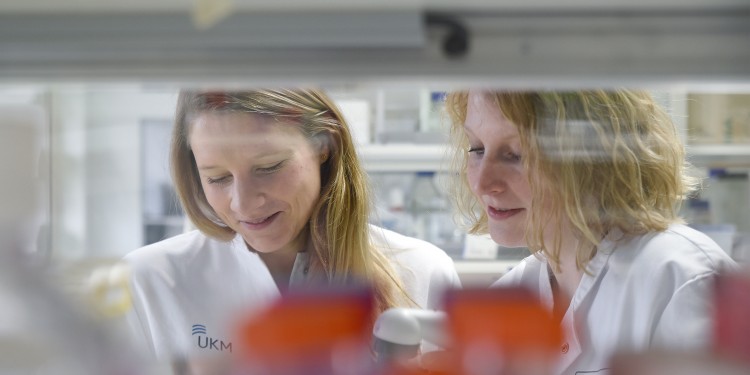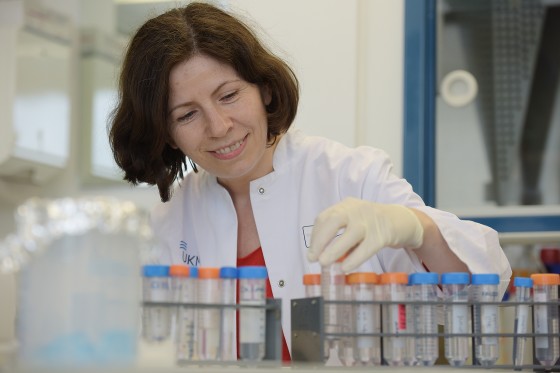
Between research and family
When biomedical scientist Julia Ghelman discovered around two years ago that she and her husband were expecting a child, she had just started out on her PhD degree at Münster University. Julia Ghelman is a member of a research group at the Cells-in-Motion (CiM) Cluster of Excellence investigating the background of the autoimmune disease multiple sclerosis. Her aim is to find out which factors define the movement behaviour of cells in the central nervous system. During her pregnancy Julia Ghelman was no longer able, for health and safety reasons, to carry out all the work in the laboratory, and at the beginning of her maternity leave she had to stop working altogether for a few months. "However, interrupting the project for a longer period of time just wasn't on," she says. She found the solution when she came across the "LabAid" programme at the Cluster of Excellence.
Researchers at CiM who are pregnant can apply to have a student assistant for up to six months who supports them in their practical work for ten hours a week as a "LabAid". The programme is designed not only to support equal opportunities between male and female researchers, but also to provide a better balance between family and career. The latter is a balancing act which is not always easy to accomplish, because a scientific career includes not only irregular working hours but also activities at various universities which entail moving house frequently. The result is that women are still under-represented in leading positions in the scientific world.
Support for pregnant researchers
Julia Ghelman applied to the CiM gender committee for a LabAid, and her application was approved a short time later. She was able to decide for herself who she wanted to have helping her in her work. After selection interviews with some of the students doing a master's degree, Katharina Groll was chosen as the LabAid. "It really was a stroke of good luck," says Julia Ghelman. "We got on well right from the beginning."
After being introduced to the work by Julia Ghelman, Katharina Groll’s task was to carry out preliminary work for the main experiments. "It worked fantastically well," Julia Ghelman recalls. "We were in constant contact during my absence, too, so I was able to answer any questions and, at the same time, I was always up to date with what was happening." Two months after the birth of her child, she began increasing the number of hours she worked – which meant that she and Katharina Groll were able to work together for about half a year.
And today? Katharina Groll is doing a doctoral degree herself at the Institute of Neuropathology. Julia Ghelman is in the third year of her own PhD course – and her daughter Mariam, who is now 15 months old, has a place at the "Chameleon" child-care centre at Münster University. "One thing I notice very clearly is that my priorities have changed somewhat," says Julia Ghelman. For this reason the 27-year-old is glad that her place of work is very family-friendly, and that sometimes she can bring her daughter with her to work for an hour or two, or occasionally work from home. She already has plans for her future career, too, and would like to stay at Münster University – either in research or in science management. "Then one of the things I could do would be to provide support for female researchers in a similar situation to mine. I think every uni needs a support centre," she says.
Easing the burden on families of researchers

During her time away, a medical student carried out a series of experiments, under her guidance; afterwards they analysed the results together. "It was fantastic," Eva Korpos says. Her assistant looked after the projects perfectly. As a result, for six months she could completely concentrate on her son after picking him up from the day care. "If it hadn't been for LabAid I would have had to finish the laboratory work in the evenings or on weekends," she says.
Translated from German by Ken Ashton
